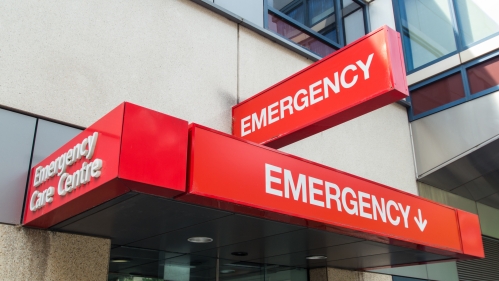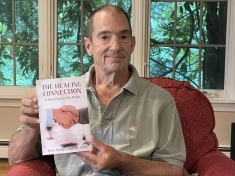
A Publication for Alumni & Friends of Rutgers Robert Wood Johnson Medical School

Drew Remignanti, MD ‘80, MPH Puts Connection at the Heart of Care
Drew Remignanti, MD ‘80, MPH, was on his way to Tonga when a chance encounter on the plane changed his life. En route to study the Polynesian island’s music, language, and volcanoes, Dr. Remignanti was seated next to an anthropology major who planned to pursue medicine.

“I was a geology major on a plane with 15 Dartmouth students, and the guy I’m sitting next to turns out to be Bob Like [Robert C. Like, MD, MS, emeritus professor and founding director of the medical school’s Center for Healthy Families and Cultural Diversity],” Dr. Remignanti remembered. “He told me he was preparing to apply to medical school, something I had never considered. He was interested in how different cultures address their healthcare needs. The aspect of geology that didn’t appeal to me was that it only involves people when there are earthquakes and volcanic eruptions. The conversation with Bob got me thinking.”
Once back in the States, he changed his major at Dartmouth College to pre-medical studies and graduated from Robert Wood Johnson Medical School in 1980.
“We had quite a unique class in medical school,” Dr. Remignanti said. “To get into medical school, you have to be fairly competitive. One of the first things we did as a class was abolish awards based on academic performance because we weren’t there to compete against each other; we wanted to help each other learn as much as possible to become good physicians.”
Making a Commitment to Emergency Medicine
Dr. Remignanti completed his emergency medicine rotation at Saint Peter’s Hospital. One patient encounter in particular helped solidify his interest in emergency medicine.
“A young girl came in with a unilateral hydrocephalus and did not look well. The neurosurgeon drilled a hole in her skull right there in the emergency department, not even in the OR, because she was deteriorating relatively quickly,” he said. “He snaked a catheter into the ventricle to relieve the pressure on her brain, which saved her life. Practicing a type of medicine in which you can intervene in dramatic fashion and affect someone’s life appealed to me. That experience set the course for my life as an emergency physician.”
One of the lessons that Dr. Remignanti remembers most vividly at medical school was learning how to perform a physical examination. The instructor urged students to place a hand on each patient’s shoulder during the exam to communicate empathy.
“At the time, I wondered why he made such a big deal over touching the patient, but it was prescient because now we’re living in an age when we’re much more involved with touching computers than we are in touching patients,” he said. “The physical exam is being de-emphasized so doctors don’t spend as much time with each patient now, but making that connection and letting the patient know that you hear them is important.”
Perhaps what has most impacted his bedside manner is more than five decades of being a patient. At age 19, he developed a chronic autoimmune disease that manifested initially as ulcerative colitis. It is still under treatment. Then, at age 38, he suffered a stroke—a complication of the same autoimmune disease—in the emergency department after working the night shift.
“That’s when I first got a primary care doctor,” he explained. “I also met my neurologist, who modeled the importance of connecting with your patients. She was trying to thread the needle between encouraging me to recover and being realistic about my odds of returning to practice emergency medicine after having a major stroke.”
Five years passed before Dr. Remignanti returned to the emergency department. While rehabilitating, he earned a master’s degree in public health from the Medical College of Wisconsin and worked clinically in occupational health and walk-in clinics. He also participated in medical missions with the World Health Organization and Centers for Disease Control and Prevention to help eradicate polio in Pakistan and Ghana.
Knowledge Is Power
Dr. Remignanti advises patients to be more engaged in their healthcare and knowledgeable about their conditions because research shows that when patients adhere to their treatment plans, the mortality rate drops by 50 percent.
“I’ve been on both sides of the bed, and I’ve stayed very involved in decisions about my healthcare, but I have the advantage of having had an MD degree and all those years of experience,” said Dr. Remignanti, who has been hospitalized 15 times. “Most people have at least one chronic, recurrent condition. Patients can and should become mini-experts in their conditions. If enough of us take that first step, when decision-makers above us pressure us to make decisions that we don’t agree are best, we can at least resist.”
In 2014, he decided that he would retire from the emergency department at Lawrence (Mass.) General Hospital in 2020 when his board certification expired. Having a finish line in sight helped him avoid burnout and enjoy his remaining years in practice. Despite leaving the field, he is still involved in healthcare.
“I knew when I retired, I wasn’t going to stop thinking about healthcare and medicine matters,” he said. “The business concepts that have been absorbed into healthcare are that the customer is always right and that success is based on productivity. Neither of those concepts is applicable because, frankly, as patients, we’re suffering. We’re afraid. We’re needy. We want resolution of our discomforts, and as physicians, we want to relieve suffering. But the way the patient wants relief from suffering is not necessarily the healthiest way. We need to get ethical and compassion-based decision-making back into healthcare.”
Not wanting to be relegated to the sidelines as the healthcare system evolved into something he no longer recognized, he began researching data for a book. Because of his career in family medicine, Dr. Like was tapped to write the book’s forward.
Dr. Remignanti’s interest in sharing his thoughts publicly began during his trip to Pakistan, when he wrote emails to friends and family reflecting on the experience. He again wrote detailed accounts in 2002, when he traveled to Ghana for a similar mission. He used his work experiences, what he learned as a patient and clinical research to write The Healing Connection: A Partnership for Your Health, published in 2023.

“My book expresses a lot of alarm about the direction that U.S. healthcare is going, but also some hopefulness about our ability to ameliorate that and change it in a way that’s healthier for all of us,” he said.
For example, it explores the effect of greater social connectedness and volunteerism on the mortality rate. Dr. Remignanti explained, “If we stay isolated within ourselves, it’s not healthy for us. Something about human connection is healing, and the literature supports this.”
It is the concept of human connection that has driven Dr. Remignanti both personally and professionally.
“Rutgers Medical School was great preparation for a career in medicine,” he said. “We had a class that was very supportive of each other, and the school provided a collegial, supportive environment that I hope persists to this day.”
In 2023, he reconnected with seven fellow alumni during a four-day informal meet-up in Chicago. He advises the next generation of physicians to make connections and be present to avoid burnout.
“Your resilience will depend on how effectively you can remind yourself why you chose this career and how much people benefit from your care,” he said. “That’s what keeps you going. We must continually remind ourselves that what we’re doing is worthwhile.”
